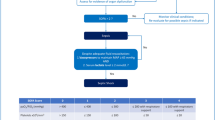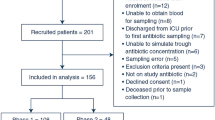Abstract
Purpose
Staphylococcus aureus bacteremia (SAB) is a serious clinical condition associated with high morbidity and mortality. Recent studies have revealed that adherence to evidence-based quality-of-care indicators (QCIs) for the management of SAB could result in reduced mortality. We aimed to determine whether compliance with QCIs was associated with mortality and whether compliance with QCIs predicted the mortality of patients with SAB.
Methods
In a university hospital in Kyoto, Japan, SAB patients, who survived at least 14 days after positive blood cultures were analyzed from 2006 to 2014 to assess their compliance with QCIs and the trend in mortality. In addition, the predicted mortality, which was stratified by the number of fulfilled QCIs (QCI points), was calculated. In this study, the following five main QCI points were evaluated: (1) follow-up blood cultures; (2) early source control when applicable; (3) echocardiography; (4) the early use of appropriate antibiotics, and (5) the appropriate duration of therapy.
Results
We identified 477 eligible SAB cases, of which 199 were MRSA cases (41.7 %). The proportion of SAB cases in which the physicians adhered to at least four QCIs increased gradually from 47.5 % in 2006 to 79.3 % in 2014 (P = 0.001); whereas, the 30-day mortality decreased from 10.0 to 3.4 % after treatment completion.
Conclusions
With an increase in the proportion of SAB cases adhering to QCIs, better prognoses were observed for patients with SAB. The QCI points reflected the 30-day mortality.


Similar content being viewed by others
References
Holland TL, Arnold C, Fowler VG. Clinical management of Staphylococcus aureus bacteremia. JAMA. 2014;312:1330.
Tong SYC, Davis JS, Eichenberger E, Holland TL, Fowler VG. Staphylococcus aureus infections: epidemiology, pathophysiology, clinical manifestations, and management. Clin Microbiol Rev. 2015;28:603–61.
Nagao M, Iinuma Y, Saito T, Matsumura Y, Shirano M, Matsushima A, et al. Close cooperation between infectious disease physicians and attending physicians can result in better management and outcome for patients with Staphylococcus aureus bacteremia. Clin Microbiol Infect. 2010;16:1783–8.
Schmitt S, McQuillen DP, Nahass R, Martinelli L, Rubin M, Schwebke K, et al. Infectious diseases specialty intervention is associated with decreased mortality and lower healthcare costs. Clin Infect Dis. 2014;58:22–8.
Borde JP, Batin N, Rieg S, Feik R, Reimling C, Kern WV, et al. Adherence to an antibiotic stewardship bundle targeting Staphylococcus aureus blood stream infections at a 200-bed community hospital. Infection. 2014;42:713–9.
Saunderson RB, Gouliouris T, Nickerson EK, Cartwright EJP, Kidney A, Aliyu SH, et al. Impact of routine bedside infectious disease consultation on clinical management and outcome of Staphylococcus aureus bacteraemia in adults. Clin Microbiol Infect. 2015;21:779–85. doi:10.1016/j.cmi.2015.05.026.
Fowler VG, Sanders LL, Sexton DJ, Kong L, Marr K, Gopal K, et al. Outcome of Staphylococcus aureus bacteremia according to compliance with recommendations of infectious diseases specialists: experience with 244 patients. Clin Infect Dis. 1998;27:478–86.
Jenkins TC, Price CS, Sabel AL, Mehler PS, Burman WJ. Impact of routine infectious diseases service consultation on the evaluation, management, and outcomes of Staphylococcus aureus bacteremia. Clin Infect Dis. 2008;46:1000–8.
Robinson JO, Pozzi-Langhi S, Pearson JC, Christiansen KJ, Coombs GW, Phillips M, et al. Formal infectious diseases consultation is associated with decreased mortality in Staphylococcus aureus bacteremia. Eur J Clin Microbiol Infect Dis. 2012;31:2421–8.
Forsblom E, Ruotsalainen E, Ollgren J, Järvinen A. Telephone consultation cannot replace bedside infectious disease consultation in the management of Staphylococcus aureus bacteremia. Clin Infect Dis. 2013;56:527–35.
Nguyen CT, Gandhi T, Chenoweth C, Lassiter J, Dela Pena J, Eschenauer G, Nagel JL. Impact of an antimicrobial stewardship-led intervention for Staphylococcus aureus bacteraemia: a quasi-experimental study. J Antimicrob Chemother. 2015;70:3390–6. doi:10.1093/jac/dkv256.
Vogel M, Schmitz RP, Hagel S, Pletz MW, Gagelmann N, Scherag A, Schlattmann P, Brunkhorst FM. Infectious disease consultation for Staphylococcus aureus bacteremia—A systematic review and meta-analysis. J Infect. 2015;72:19–28. doi:10.1016/j.jinf.2015.09.037.
Townsend J, Pelletier J, Peterson G, Matulevicius S, Sreeramoju P. Quality Improvement of Staphylococcus aureus Bacteremia Management and Predictors of Relapse-free Survival. Am J Med. 2015;129:195–203. doi:10.1016/j.amjmed.2015.09.016.
Bai AD, Showler A, Burry L, Steinberg M, Ricciuto DR, Fernandes T, et al. Impact of infectious disease consultation on quality of care, mortality, and length of stay in Staphylococcus aureus Bacteremia: results from a large multicenter cohort study. Clin Infect Dis. 2015;60:1451–61.
Fries BL, Licitra C, Crespo A, Akhter K, Busowski MT, Salazar D, et al. Infectious diseases consultation and the management of Staphylococcus aureus bacteremia. Clin Infect Dis. 2014;58:598–9.
López-Cortés LE, Del Toro MD, Gálvez-Acebal J, Bereciartua-Bastarrica E, Fariñas MC, Sanz-Franco M, et al. Impact of an evidence-based bundle intervention in the quality-of-care management and outcome of Staphylococcus aureus bacteremia. Clin Infect Dis. 2013;57:1225–33.
Blot K, Bergs J, Vogelaers D, Blot S, Vandijck D. Prevention of central line-associated bloodstream infections through quality improvement interventions: a systematic review and meta-analysis. Clin Infect Dis. 2014;59:96–105.
Rello J, Afonso E, Lisboa T, Ricart M, Balsera B, Rovira A, et al. A care bundle approach for prevention of ventilator-associated pneumonia. Clin Microbiol Infect. 2013;19:363–9.
Steinmetz T, Eliakim-Raz N, Goldberg E, Leibovici L, Yahav D. Association of vancomycin serum concentrations with efficacy in patients with MRSA infections: a systematic review and meta-analysis. Clin Microbiol Infect. 2015;21:665–73.
Charlson ME, Pompei P, Ales KL, MacKenzie CR. A new method of classifying prognostic comorbidity in longitudinal studies: development and validation. J Chronic Dis. 1987;40:373–83.
Rhee J-Y, Kwon KT, Ki HK, Shin SY, Jung DS, Chung D-R, et al. Scoring systems for prediction of mortality in patients with intensive care unit-acquired sepsis: a comparison of the Pitt bacteremia score and the Acute Physiology and Chronic Health Evaluation II scoring systems. Shock. 2009;31:146–50.
Kim S-H, Park W-B, Lee K-D, Kang C-I, Kim H-B, Oh M, et al. Outcome of Staphylococcus aureus bacteremia in patients with eradicable foci versus noneradicable foci. Clin Infect Dis. 2003;37:794–9.
Cosgrove SE, Sakoulas G, Perencevich EN, Schwaber MJ, Karchmer AW, Carmeli Y. Comparison of mortality associated with methicillin-resistant and methicillin-susceptible Staphylococcus aureus bacteremia: a meta-analysis. Clin Infect Dis. 2003;36:53–9.
Blot SI, Vandewoude KH, Hoste EA, Colardyn FA. Outcome and attributable mortality in critically Ill patients with bacteremia involving methicillin-susceptible and methicillin-resistant Staphylococcus aureus. Arch Intern Med. 2002;162:2229–35.
Robinson JO, Phillips M, Christiansen KJ, Pearson JC, Coombs GW, Murray RJ. Knowing prior methicillin-resistant Staphylococcus aureus (MRSA) infection or colonization status increases the empirical use of glycopeptides in MRSA bacteremia and may decrease mortality. Clin Microbiol Infect. 2014;20:530–5.
Ammerlaan H, Seifert H, Harbarth S, Brun-Buisson C, Torres A, Antonelli M, et al. Adequacy of antimicrobial treatment and outcome of Staphylococcus aureus bacteremia in 9 Western European countries. Clin Infect Dis. 2009;49:997–1005.
Nagao M. A multicentre analysis of epidemiology of the nosocomial bloodstream infections in Japanese university hospitals. Clin Microbiol Infect. 2013;19:852–8.
Palraj BR, Baddour LM, Hess EP, Steckelberg JM, Wilson WR, Lahr BD, et al. Predicting Risk of Endocarditis Using a Clinical Tool (PREDICT): Scoring System to Guide Use of Echocardiography in the Management of Staphylococcus aureus Bacteremia. Clin Infect Dis. 2015;61:18–28. doi:10.1093/cid/civ235.
Ziegler MJ, Pellegrini DC, Safdar N. Attributable mortality of central line associated bloodstream infection: systematic review and meta-analysis. Infection. 2015;43:29–36. doi:10.1007/s15010-014-0689-y.
Zhang Q, Li D, Bai C, Zhang W, Zheng S, Zhang P, Zhang S. Clinical prognostic factors for time to positivity in cancer patients with bloodstream infections. Infection. 2016. doi:10.1007/s15010-016-0890-2.
Heriot G, Yeoh J, Street A, Ratnam I. Echocardiography has minimal yield and may not be warranted in Staphylococcus aureus bacteremia without clinical risk factors for endocarditis. Eur J Clin Microbiol Infect Dis. 2015;34:1231–6. doi:10.1007/s10096-015-2352-7.
Naucler P, Berge A. Screening Algorithm to Perform Transesophageal Echocardiography in Patients With Staphylococcus aureus Bacteremia. Clin Infect Dis. 2015;61:1630. doi:10.1093/cid/civ634.
Author information
Authors and Affiliations
Corresponding author
Ethics declarations
Conflict of interest
This study was conducted with departmental funding only. The authors declare that they have no other conflicting interests in relation to this work.
Electronic supplementary material
Below is the link to the electronic supplementary material.
Rights and permissions
About this article
Cite this article
Nagao, M., Yamamoto, M., Matsumura, Y. et al. Complete adherence to evidence-based quality-of-care indicators for Staphylococcus aureus bacteremia resulted in better prognosis. Infection 45, 83–91 (2017). https://doi.org/10.1007/s15010-016-0946-3
Received:
Accepted:
Published:
Issue Date:
DOI: https://doi.org/10.1007/s15010-016-0946-3




